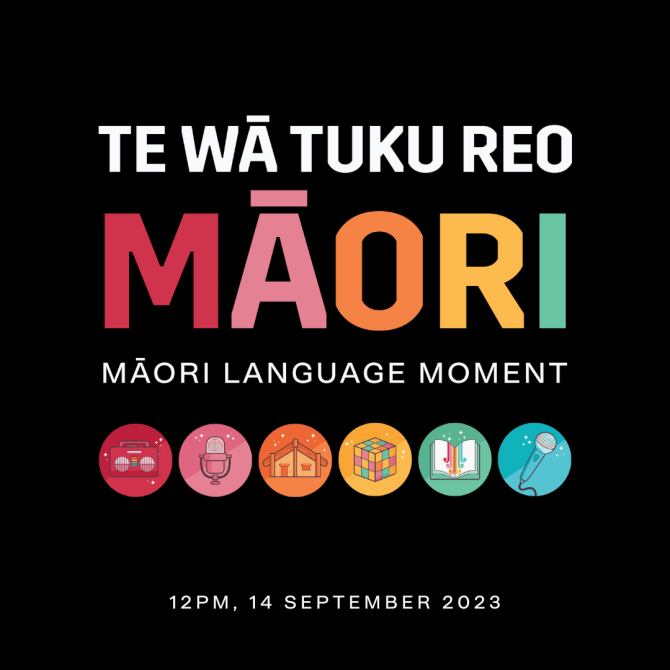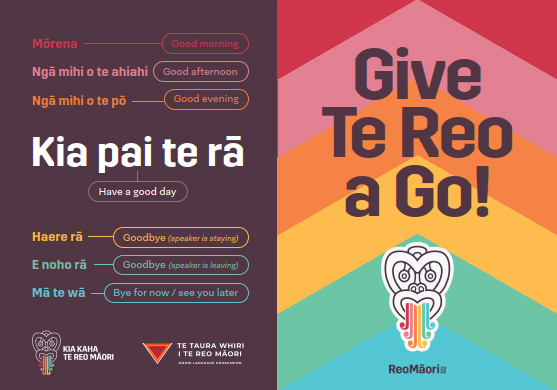Mō tēnei wiki, he kaupapa whakahirahira mō ngā tangata e noho ana ki Aotearoa, ōtira ko te wiki o te reo Māori.
Ka hokinga mahara au ki tētahi whakataukī kia puta ai ngā whakaaro tokomaha, ‘Whāia te mātauranga hei oranga mō koutou.’This week focuses on an important topic for all those who live in Aotearoa New Zealand which is te wiki o te reo Māori, Māori language week. I think back to a proverb in particular that provokes many of thoughts, “Seek after learning for the sake of your well-being.”
I’ve proudly grown up with an understanding of what the different teachings and outcomes that come from our pūrākau mō Ngā Atua, the myths and legends of our Atua and the wars, battles and adversities they had to overcome and how I can apply some of those to benefit and maximise the different experiences I encounter. This year for Te Wiki o Te Reo Māori, I want to take us all on a journey in learning pūrākau (mythical stories) about our Atua and how we can view them within our spaces, how they could help to inform us with certain situations as well as how our uara (values) are relative to the outcomes of these stories.
We continue on our journey of understanding how waiata plays another huge part of keeping the memories of our traditional stories alive and how we can use waiata to retell our stories today, so some of these waiata we will journey through will have undertones of my childhood and the waiata my nanny and koro would sing and play for me growing up, I also want to introduce us into some of waiata from today and how our rangatahi have found a segway into learning and listening to Māori universal.
Kupu hou me tētahi whākataukī mō te rā will also be rolling out again as a way for us to use te reo Māori in our everyday sentences as well as having our proverbs underpinning the different value represented through our atua pūrākau.
Te Wā Tuku Reo Māori
This kaupapa was launched 2021 as a way to understand how we can all use te reo Māori in our own everyday situations, it’s as small as saying “kia ora” instead of saying “hello” everytime you see someone. Te Wā Tuku Reo Māori lets you have the power to challenge or strengthen the small pockets of matauranga you have in your back pūkoro (pocket) so have a look at what some of our whānau got up to and have an aro on what you could try next.
Visit Te Wā Tuku Reo Māori | Māori Language Moment
Ranginui rāua ko Papatūānuku
Ko Ranginui e tū iho nei, ko ia te kaitiaki mō te rangi nei. Ko Papatūānuku e Takato ake nei, ko ia te kaitiaki mō te whenua nei. Kia piri tahi rāua kei raro I te korowai o te aroha mutunga kore, ā, ka whānau mai ngā tama tokomaha, ko Tangaroa, ko Haumietiketike, ko Tāwhirimātea, ko Tāne Māhuta, ko Tūmātauenga, ko Rongomatāne, ko Tangaroa. Ka tipu ngā tama kei waenga i te piri tahi kaha o ōna matua, ka pīrangi ētahi te wehe, ka whakahē ētahi anō. Nā wai rā, ko Tāne te atua i wehe atu ōna matua, ka tukuna atu a Ranginui ki runga rā. I a rā, ka haramai te ua he tohu kia tangi hotu ana ngā roimata a Ranginui ki tōna aroha pūmau ko Papatūānuku. E noho tonu ana a Papatūānuku ki te whenua kia tīaki ētahi tama I tipu kei runga i te whenua.
Ranginui stands above us as the guardian of the sky. Papatūānuku lays here as the protector of the land. The two bound together under the embrace of love, in so their sons Tangaroa, Haumietiketike, Tāwhirimātea, Tāne Māhuta, Tūmātauenga, Rongomatāne and Tangaroa and many more were born. The sons grew up in between the strong embrace of their parents, some wanted separations and others didn’t agree. Some time went on and it was Tāne Māhuta who separated their parents, Ranginui was sent into the sky. Every now and then, the rain comes and it’s a sign over the never-ending cry of Ranginui to his one love Papatūānuku. Papatūānuku remains on the lands caring for those of her sons who grew up down on the land.
Kaitiakitanga
Rangi and Papa gave me my first taste of kaitiakitanga or the concept about guardianship and protecting the integrity of the whole of something. The bond they had for each other was inseparable, literally, but they held strong knowing nothing could break them apart. Even after the separation, the efforts and the lengths they both go to ensure the safety and growth of their tamariki both high and low, lastly in their last efforts to show how they can protect and guard each other and the love they have for each other by the small acts of kindness for each other, ie: Rangi cries for Papa thus in return waters the land and helps it to grow. Papa protects the different offsprings that sprout and reach high up to Rangi to give fresh air back into our rangi (sky). There are so many other paths this pūrākau could take us but let us save those for our various wānanga moments where we can openly have these kōrero about where our whakaaro (thought) was going.
Te waiata, tukuna ki te ao
To kick us off this week, he hokinga mahara tātou ki te pakanga tuatahi, ko tēnei waiata he waiata aroha ki tō māreikura I noho ia ki te kainga, aue te aroha mokemoke ki te piri tahi anō. Let’s take a trip back in time to the first world war, this song was a love song for your loved one sitting at home, the loneliness to hold you and embrace once more, I runga o ngā puke. Accompanied with the ā-ringa, this waiata puts a huge smile on my face but reminds me just how special and important it is to really be present with those that we love, how we protect and care guard them as they journey into the world, lastly about the ongoing sacrifices we endure no matter how big or small to allow space for our love ones to know we are here for them ahakoa te aha.
Maramataka
This is a new short, sharp and simple segment sort of like a news update but a maramataka (lunar cycle) update reading:
Otane – good day for fishing, eeling and crayfishing, Reasonable day for planting, the energy is high for this so keep that in our back pūkoro for planning on this day.
Kupu mō te rā
Today’s kupu mō te rā, word of the day is ‘tau’ which translates into ‘to settle, calm down’. For example when using this word, you could use it in situations that may be slightly stressful or things are just overwhelming at the time, you can stop and say, “ kia tau __(your name)__.” Growing up, I often heard this being said to my cousins, my sisters and myself repeatedly as the spontaneous wairua of our tamariki often don’t tend to stop and think and sometimes situations can be overwhelming for us at such a young age. As a pakeke (adult) we understand that we all have stressful work life, home life, relationship life, friendship life and all the other things that make us who we are, so next time when you get in that moment, think back to these different types of mātauranga, which one resonates with you and what can we use from that to maximise the experience we are dealing with at hand.
Kia pai o koutou rā.
Justice
Kaitakawaenga Māori
Māori Services






Add a comment to: Rāhina: Te Wiki o te Reo Māori with Justice